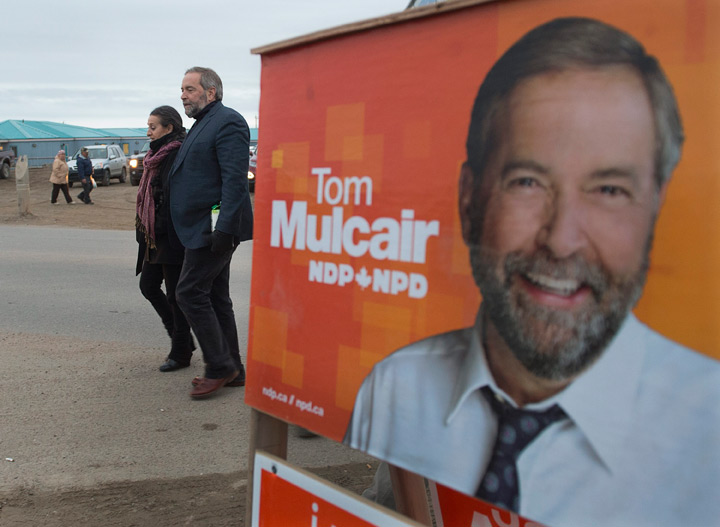Several national polls are showing declining support for the NDP – and it has a lot to do with their stance on the niqab, some political observers say.

A recent poll for Global News by Ipsos Public Affairs found that the Liberals were in the lead with 33 per cent of decided voters, the Conservatives in second with 32 per cent, and the NDP in third place with 27 per cent. Other polls have found similar results.
The NDP had started the election in first, but has lost support since early September.
READ MORE: Liberals maintain narrow lead, Conservatives surge in Ontario – poll
The party’s difficulties are regional, said Darrell Bricker, CEO of Ipsos Public Affairs. “The strength of the NDP is their presence in Quebec,” he said, and they’re losing that base. “The entire impact on national polls you see right now with the decline of the NDP is a product of Quebec.”
In about three weeks, NDP support in Quebec has dropped by 13 percentage points, according to Ipsos.
READ MORE: Tories move ahead of Liberals, NDP in latest seat projections
Bricker thinks that this is a direct result of the niqab becoming an election issue. “It’s the only thing that’s changed,” he said.
The issue of whether the government should be allowed to tell women not to wear niqabs during citizenship ceremonies made for particularly heated exchanges during last week’s French-language debate.
- Iran fires air defences at military base after suspected Israeli drone attack
- U.S. aid to Ukraine, Israel set to pass. But bills differ in one key area
- Carbon rebate labelling in bank deposits fuelling confusion, minister says
- Conservatives ask interference inquiry judge to rule elections were flawed
NDP leader Tom Mulcair said that Conservative leader Stephen Harper was raising the divisive issue to distract from his economic record.
“Never, never will I say to my daughter that a woman has to cover her face because she’s a woman,” replied Harper, highlighting the difference between how the Conservatives and NDP are framing the issue.
The Department of Citizenship and Immigration says that it is aware of only two people who have chosen not to proceed with the citizenship ceremony because they were forced to remove face coverings.
But appealing to secular norms plays well in Quebec, says Linda Cardinal, professor at the University of Ottawa’s School of Political Studies.
“It’s not the number that is the issue, it’s the principle. It’s the symbol of it,” she said.
Quebecers have spent years debating the accommodation of minorities, including the 2008 Bouchard-Taylor Commission on the issue which recommended that some public officials be prohibited from wearing religious symbols, Cardinal said.
“And so, for Quebecers, it’s like going backwards instead of going forwards in terms of moving ahead on that issue.”
84 per cent of Quebecers support the requirement to remove face coverings, according to a September 28 Ipsos poll.
In Quebec, Cardinal said, the Bloc Quebecois is working hard to keep niqabs on the agenda, and is hurting the NDP with their efforts.
But unlike Bricker, she doesn’t think it’s all about the niqab: Mulcair’s stance on issues such as TransCanada’s Energy East pipeline, which he doesn’t oppose, could also be costing him in Quebec.
“In Quebec it’s also the environment, the oil, pipelines. I think that’s another issue that is important to Quebecers and the kind of paradoxical approach of the NDP towards the pipeline,” she said.
Mulcair has his work cut out for him, thinks Bricker.
“You’ve got a situation in which you’ve got Quebec nationalists, softer nationalists maybe, combined with a very strong left in the rest of the country. That’s a very difficult combination to pull together,” he said.
And where those groups may differ, such as on the state’s right to dictate citizenship dress codes, could make Mulcair choose between his supporters.
It’s not just voters either – already, several NDP candidates, including incumbent Romeo Saganash, have publicly stated their opposition to the niqab, according to media reports.
Alex Bushell, a former NDP campaign worker and current consultant for Environics Communications, is more skeptical about the niqab’s overall effect on the campaign.
“Is that the one issue that people are going to cast their ballot on? Some people say yes but my gut says no.”
“The niqab issue was something that no one was talking about two weeks ago and now it’s the issue that some people are saying is defining the election. In another week we might have another issue that’s defining the election.”
There is still time for the NDP to take back the lead, Bushell said. In 2011, the NDP surged in the polls less than two weeks before election day. It’s now 19 days away.



Comments